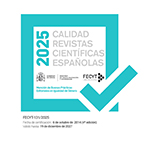La reafirmación de la masculinidad en la cruzada franquista
Resumen
Después de la primera guerra mundial, el soldado se convirtió en el arquetipo masculino. En esa época, las ideas de la masculinidad se centraron en la agresión: el hombre nuevo fascista sería el agente de cambio político y social. El golpe militar de 18 de julio sirvió como un llamamiento a los hombres de España para regenerar a su país. Las ideas falangistas de la belleza masculina, la hermandad y la camaradería de las trincheras crearon un nuevo entendimiento de la virilidad en España. Este culto de la virilidad era fundamental en la movilización del bando franquista durante la guerra civil y parecía que la victoria fortaleciera este concepto de la masculinidad. Sin embargo, pronto se abandonaron las sociedades horizontales de la hermandad fascista a favor de las comunidades verticales de la historia y el linaje, tan importante en la tradición carlista. La clave para entender la masculinidad fomentada por el Nuevo Estado durante la posguerra era el paternalismo en vez del fascismo.Descargas
Descarga artículo
Licencia
La revista Cuadernos de Historia Contemporánea, para fomentar el intercambio global del conocimiento, facilita el acceso sin restricciones a sus contenidos desde el momento de su publicación en la presente edición electrónica, y por eso es una revista de acceso abierto. Los originales publicados en esta revista son propiedad de la Universidad Complutense de Madrid y es obligatorio citar su procedencia en cualquier reproducción total o parcial. Todos los contenidos se distribuyen bajo una licencia de uso y distribución Creative Commons Reconocimiento 4.0 (CC BY 4.0). Esta circunstancia ha de hacerse constar expresamente de esta forma cuando sea necesario. Puede consultar la versión informativa y el texto legal de la licencia.











